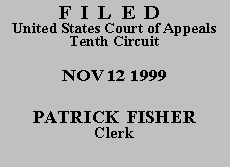

| DICK NEILSON,
Plaintiff-Appellant, v. JON M. MEMMOTT, individually and in his capacity as Second Judicial District Court Judge; STEPHEN NEBEKER; RICK ROSE; WILLIAM A. MARSHALL; ROSANNE KRAUS, individually and as Custodian of Records - Camarillo State Hospital; NIKKI BATRES, individually and as Custodian of Records - Patton State Hospital; VIRGINIA PADGETT, individually and as Custodian of Records - Atascadero State Hospital; WHITE MEMORIAL CENTER, Custodian of Records; ATASCADERO STATE HOSPITAL, Custodian of Records; THE STATE OF UTAH, Defendants-Appellees. |
|
Plaintiff's allegations of constitutional violations in this case arise from a proceeding in Utah state court, in which plaintiff's medical records were subpoenaed from California hospitals, to be used in the defense of an action brought by plaintiff in state court. Plaintiff brought suit in federal district court, complaining that the defendants violated his constitutional rights in connection with the issuance of and compliance with the subpoenas. Plaintiff's amended complaint alleges: violations of 42 U.S.C. §§ 1983, 1985, and 1988; violation of plaintiff's privacy rights; violation of the doctor-patient privilege; unspecified constitutional violations; and negligence. The district court granted defendant Judge Memmot's motion to dismiss, finding that he was immune from suit; granted defendant attorneys Nebeker, Rose, and Marshall's motion to dismiss, finding that they were not state actors and that there was insufficient evidence of a conspiracy with a state actor (Judge Memmot) to violate plaintiff's civil rights; granted defendant White Memorial Hospital's motion for summary judgment, finding no personal jurisdiction and, alternatively, that it was not a state actor; and granted defendants Kraus, Batres, and Padgett's motion to dismiss, finding that they were entitled to qualified immunity. No party raised a question regarding the district court's jurisdiction, and it did not discuss its jurisdiction.
As a threshold matter before reviewing the merits of the district court's action, we have a duty to examine our own jurisdiction. See Lopez v. Behles (In re American Ready Mix, Inc.), 14 F.3d 1497, 1499 (10th Cir. 1994). Further, a party may challenge subject matter jurisdiction for the first time on appeal. See Oklahoma City Assocs. v. Wal-Mart Stores, Inc., 923 F.2d 791, 794 (10th Cir. 1991). Because we hold that the district court had no jurisdiction, we must dismiss this appeal and remand the case to the district court with instructions to vacate its judgment and dismiss the amended complaint for lack of subject matter jurisdiction.
The Rooker-Feldman doctrine prohibits the district court's consideration of plaintiff's amended complaint. See Rooker v. Fidelity Trust Co., 263 U.S. 413, 415-16 (1923); District of Columbia Court of Appeals v. Feldman, 460 U.S. 462, 486 (1983). "The Rooker-Feldman doctrine bars 'a party losing in state court . . . from seeking what in substance would be appellate review of the state judgment in a United States district court, based on the losing party's claim that the state judgment itself violates the loser's federal rights.'" Kiowa Indian Tribe of Okla. v. Hoover, 150 F.3d 1163, 1169 (10th Cir. 1998) (quoting Johnson v. De Grandy, 512 U.S. 997, 1005-06 (1994)). "Federal district courts do not have jurisdiction 'over challenges to state-court decisions in particular cases arising out of judicial proceedings even if those challenges allege that the state court's action was unconstitutional.'" Van Sickle v. Holloway, 791 F.2d 1431, 1436 (10th Cir. 1986) (quoting Feldman, 460 U.S. at 486). In addition to prohibiting consideration of matters actually decided by state courts, the doctrine also precludes a federal court from providing relief that is "inextricably intertwined" with the state court decision. Feldman, 460 U.S. at 482-84 n.16; see also Facio v. Jones, 929 F.2d 541, 543 (10th Cir. 1991).
In his amended complaint, plaintiff requested the following relief: an order directing that plaintiff's medical records and all copies be delivered to plaintiff; damages from the various defendants for violation of plaintiff's civil rights resulting from their parts in requesting, issuing, and complying with the subpoenas; an order setting aside the state court judgment and ordering that the case be reopened; an injunction barring the future release of plaintiff's medical records to anyone; and costs and fees associated with bringing the federal action. In the state court action, plaintiff filed a motion to quash the subpoenas requesting his medical records, arguing that release of the medical records would violate his constitutional rights and that the records were irrelevant and being sought only to harass and embarrass him. The state court held a hearing on the motion, and, after hearing plaintiff's arguments against the issuance of the subpoenas, denied the motion to quash.
Plaintiff's request that the district court set aside the state court judgment is beyond the district court's jurisdiction. See id. All of the remaining forms of relief plaintiff requested from the district court are inextricably intertwined with the state court's denial of plaintiff's motion to quash the subpoenas. The district court could not have considered any of plaintiff's claims or granted any of the requested relief without, in effect, reviewing the state court's decision to allow the subpoenas to issue. See Van Sickle, 791 F.2d at 1436. Consequently, plaintiff has in essence asked the district court to review the final decision of the state court on the issuance and validity of the subpoenas. Because the district court was without jurisdiction to perform such review, we DISMISS the appeal and REMAND the case to the district court with instructions to vacate its judgment and dismiss the action for lack of jurisdiction.
Entered for the Court
Circuit Judge
*. This order and judgment is not binding precedent, except under the doctrines of law of the case, res judicata, and collateral estoppel. The court generally disfavors the citation of orders and judgments; nevertheless, an order and judgment may be cited under the terms and conditions of 10th Cir. R. 36.3.